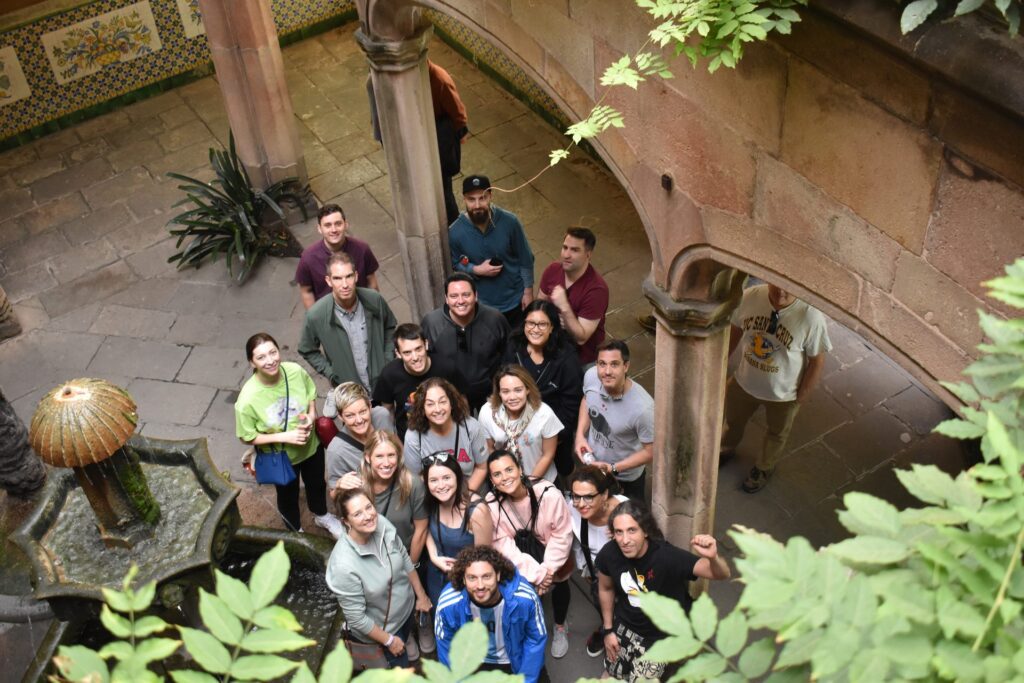Skift Take
Travel has a valuable role at database software company Percona, and after 15 years being a remote organization it has come up with a do-it-yourself formula that seems to be working — for now.

Future of Work
As organizations start to embrace distributed work and virtual meetings, the corporate travel and meetings sectors are preparing for change. Read Skift’s ongoing coverage of this shift in business travel behavior through the lens of both brands and consumers.
“Scrappy” is how Ann Schlemmer, CEO of Percona, describes her company’s approach to booking team travel and retreats.
If you work in the travel industry, that word translates as “unmanaged” and companies like Percona are currently of huge interest to agencies and other new platforms being built to help manage the complexities of travel in an increasingly remote world.
Percona, a database software company, has 350 employees and has been a remote organization for more than 15 years, well before it was a thing. Yet for almost all that time it’s made do without a travel agency.
From Airbnbs on the beach in Brazil to an all-inclusive resort in the Dominican Republic, Schlemmer notes that Percona has always a had decentralized approach to managing travel. There’s not even a real expense policy — she advocates for her teams to be “frugal smart.”
Weighing Up the Criteria
You could call the technology company “mature” in terms of its remote working culture, but it has always supplemented the Zooming with in-person meetings.
There’s a lot of trust in staff to get things done, and Schlemmer said she leaves the budgeting to individual departments.
“We tend to be a little scrappy even though we’ve been around for 16 years,” she joked. “Each team will study where their team members are, and then pick a location. We look at visas, we look for places that are economical. One of our expense policies is to be ‘frugal smart.’”
Locations are then assessed on whether they are good transportation hubs, with airports or train stations. “We have some teams that are geographically concentrated, and we’d go with the majority decision in that case. Others are truly global,” she added.
Another insight is that travel decisions are also dependent on team personalities. New travel booking software may come up with the most logical solutions, but can it take into account the human factor? For example, Schlemmer said some engineers fall under the “frugal” category so you can find them congregating in eastern Europe. Previous destinations include Montenegro and Croatia.

Some teams will also naturally fall way under budget because of their location in the world, or they’re willing to “bunk together.”
Another team has three main groups, but when they get together they want to be really immersed, she added. They’re the ones who rented the Airbnb in Brazil. They bring in a cook, and then they go out for team building. “It’s a mix of working hard, and being in a beautiful setting as well,” she said.
Last October some of the staff headed to Turkey, with rafting and zip lining on the menu. And in 2022 Lisbon, Portugal, hosted a total of four meetings. Percona has even taken over an entire hotel.
And for the wow factor? “We once did sales kick-off in the Dominican Republic, at an all-inclusive resort,” said Schlemmer. “Partly for cost, but also for that reward feeling.”
Before the pandemic, Percona did for a short while use a travel agency. “After a year or two, we did see the benefit. It’s something we need to look at again, as we scale, for those efficiencies,” she added.
Sidenotes
Spring is already in the air for two outdoor travel specialists, Getaway and Campsited, which have now formalized their corporate packages to entice more employees into the outdoors.
Getaway has now officially launched packages across its “outposts” in the U.S. It has teamed up with event specialist Mint Collective to customize the experiences for businesses, and will handle event logistics, design and decor, branded activations, wellness experiences, local adventures and culinary experiences.
Meanwhile digital open-air marketplace Campsited, which has 270,000 accommodation sites, has launched a program called “Open Air Work From Anywhere.” Companies can pack off staff to Campsited’s spots across several countries for one to 12 weeks at a time.
Its locations are vetted for WiFi availability and suitable working and living amenities, and Campsited offers e-sim mobile data packages for the employees.
Campsited said as well as an incentive to add to an employee benefits program, it genuinely makes a difference to the health, happiness and motivation of a company’s workforce.
“We have tried many engagement efforts with our workforce to promote health and wellbeing,” said John O’Sullivan, chief operating officer at call centre Zevas, one of Campsited’s new clients. “(It) gives us a significant opportunity to positively benefit employees with an exciting and affordable way to work, travel and undertake new experiences simultaneously.”
Countries on offer include including France, Italy, and Spain, with the U.S. and South Africa coming soon. Campsited is working with Rowena Hennigan, a thought leader and academic in remote work, to further develop the program.
10-Second Corporate Travel Catch-Up
Who and what Skift has covered over the past week: Air France, American Airlines, American Express Global Business Travel, Best Western, JetBlue, Lufthansa, Soho House, Spotnana, Transcorp Hotels, TravelPerk, Travelsoft, Uber.
In Brief
One Global Alliance Expands
Globetrotter Corporate Travel has become the latest agency to join new consortium One Global. Globetrotter has been in business for 30 years, and operates in Australia and New Zealand. One Global, a joint venture of U.S.-based World Travel and U.K.-based Clarity Business Travel, launched last October. Other remembers include Canada’s Travelpath, Sweden’s Big Travel and Singapore’s Citystate Travel.
Business Travel Association Outlines Industry Worth
The UK’s Business Travel Association estimates the business travel sector contribution was £27.5 billion ($32.8 billion) in 2022. That figure is gross value added (GVA), a measure of the value of goods and services produced in an area, industry or sector of an economy, and was calculated based on analysis by the UK’s Confederation of British Industry. Business travel also accounted for more than 283,500 full-time jobs last year. “Our report unequivocally shows that business travel is so much more than suited executives turning left on a plane,” said Clive Wratten, CEO of the association. “It impacts the entire business network across the UK and worldwide.”
The Daily Newsletter
Our daily coverage of the global travel industry. Written by editors and analysts from across Skift’s brands.
Have a confidential tip for Skift? Get in touch
Tags: airbnb, brazil, business travel, corporate travel, corporate travel management, Future of Work Briefing, Skift Pro Columns